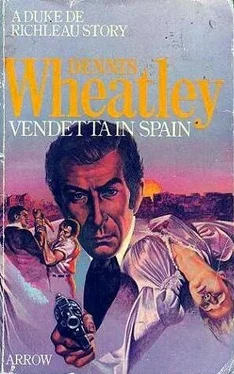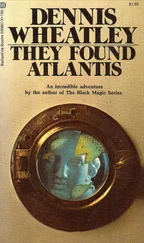|That would be excellent. For how long may I keep it?'
'A few days should be sufficient for you to make such notes as you require from it. Should the police ask to have it back I can always put them off by saying that I have not yet had time to study
it fully.'
For some ten minutes more they discussed the matter; then Don Alfonso rang the bell, the others came back into the room, and shortly afterwards they all escorted him down to the courtyard.
The arrangement about the dossier worked without a hitch and de Vendome brought it to the Count on the following afternoon; but it proved far larger than he had expected, and consisted of so many papers that they filled two large suitcases. Delighted to have so much material to examine, de Quesnoy set to work on it that evening.
It was a quiet household. De Vendome was a deeply religious young man and, with Father Tomaso's help, was endeavouring to catch up in his work as President of numerous Church charities; he was also an exceptionally fine horseman and he had won prizes for jumping at International Horse Shows; so he spent much of his time out riding or playing polo with the King. The Infanta, aided by her lady-in-waiting Dona Isabella, also busied herself with many charities and at other times pottered in her garden. Conde Ruiz was much in Madrid on business and spent most nights there at the family Palacio, as the two brothers were devoted to one another, and, although the Palacio was owned by the elder, it was so spacious that the younger also had a private suite there and he, his wife and his stepson made it their home when living in the capital.
In consequence, de Quesnoy had few interruptions and he spent many hours up in a room at the top of the house, of which he had been given the key, reading and making extracts from the great pile of police reports on Mateo Morral and subversive pamphlets, etc., that had been seized during raids on Nakens' publishing office and the premises of other anarchists suspected of being associated therewith.
Morral, it transpired, was the son of a wealthy cotton spinner who had given him an excellent education, which included sending him for some years to study in Germany. But he was of a morose and brooding disposition and had soon adopted revolutionary views. For a long time past Barcelona had been the centre of an increasingly strong demand for Home Rule for Catalonia, and on MorraFs return to his native province he had fervently embraced this movement to break away from the central government. The movement contained many anarchists and Morral became one of them.
At that time the most prominent anarchist in Barcelona was a man named Francisco Ferrer. He had been born at Alella, a little place some twelve miles outside the city, and was now in his middle forties. As a young man Ferrer had attached himself to Ruiz Zorrilla, the Republican leader of the days of Isabella II and the
Revolutionary period that followed her downfall. After Zorrilla had been sent into exile he settled at Geneva and Ferrer joined him there, later acting as his intermediary with revolutionaries in Spain who had gone into hiding.
In 1885 Ferrer's treasonable activities were discovered, but he had been warned in time and escaped to Paris, where his wife and children joined him. There for a number of years he earned a precarious living as a teacher of languages. Being a very highly-sexed man and an enthusiastic advocate of the anarchist doctrine of Free Love, his home life was not a'happy one, and on one occasion his wife had tried to shoot him. However, there was evidently something about him that made a special appeal to women, as he never lacked for mistresses, and a lady named Mile Meunier, who possessed considerable wealth, had become a disciple of his.
Mile Meunier was particularly enthusiastic about a scheme he had evolved to bring about revolution by educating promising young students to become atheists and anarchists, and to enable him to proceed with it she left him a valuable block of house property in Paris. A Liberal government in Spain having quashed prosecutions pending against Ferrer and a number of other agitators in exile he had, in 1901, returned to Barcelona and, with Mile Meunier's money, opened an establishment which he named the Escuela Moderna.
Ferrer staffed his school with fellow anarchists, both male and female, then added to it a considerable library and an 'educational' publishing business. The library consisted of Rationalist, Positivist, Revolutionary and Communist books and pamphlets of all kinds, and most of the many accounts of anarchist activities which, for the past twenty years, had met with a ready sale in most European countries. The publishing side produced translations of works by French, German and British sociologists of advanced or revolutionary views, and distributed them to booksellers throughout Spain.
The Church, and numerous other respectable bodies in Barcelona, had protested in the strongest possible terms at young people in their midst being openly led to deny God and become enemies of the State. But such was the strength of the Liberal insistence on maintaining freedom of speech that their protests had been rejected by the authorities, and for the past five years Ferrer had continued vvithout interference to canalize youthful enthusiasm into revolutionary channels and to disseminate literature calculated to inflame the discontented.
Morral had naturally become an intimate of Ferrer and after a time Ferrer had made him the librarian at the Escuela Moderna where one of the women teachers was a Senorita Soledad Villafranca, who was said to be very attractive. She had become one of Ferrer's mistresses and at the same time the mistress of Morral. One theory was that the two men had quarrelled over her and that this had led Morral to plan his attack on the King and Queen to show his mistress what a fine fellow he was. Another theory was that Ferrer had used the Senorita Villafranca to influence Morral into making his attempt, although there was no evidence of this.
In addition to these particulars about Morral and Ferrer the dossier contained brief biographies of Ferrer's teaching staff which showed that, although no criminal act could be imputed to any of them, they all openly proclaimed their allegiance to anarchist principles, and that, at one time or another, most of them had been mixed up with Communists, Collectivists, and other types of advanced Socialists whose object was to bring about a dictatorship of the proletariat.
From the seized pamphlets de Quesnoy gathered that the object of the anarchists was not only to overthrow the existing governments in every country, but also to abolish rule by law. That explained to him a point about their activities which had at times puzzled him. Although since the early 'eighties there had been many attempts to assassinate Monarchs and Presidents, there had been many more against Public Prosecutors and Judges; and it now emerged that whenever an anarchist was caught after an outrage and condemned to death or a long prison sentence, his confederates invariably did their utmost to avenge themselves upon the lawyers who had helped to convict or sentence him.
Ever since de Quesnoy had been a boy, there had also been an increasing number of outrages in connection with labour disturbances, particularly in the mining districts of France and Belgium. Pits had been flooded and hoisting gear and the houses of pit-owners blown up; on many occasions troops had had to be called in and ordered to fire on the mobs before such riots could be quelled. The anarchists took the credit for these dynamitings, but the strikes were clearly Communist-inspired; so the Count naturally assumed, as did most other people of his class, that Marxists, Anarchists, Communists, Syndicalists and Nihilists were more or less interchangeable terms for the same type of people, and that although they might differ slightly in their doctrines their common object was to bring about a Socialist world.
Читать дальше












